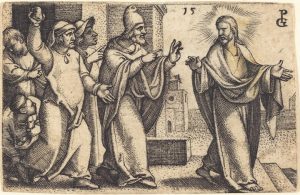HOMILY EASTER SEASON WEEK 04 02 – Year II
Called to Kerygma and Didache
(Acts 11:19-26; Ps 87; Jn 10:22-30)
********************************************************
Do the words Kergyma and Didache resonate with you?
These two words capture the dynamic of the activity of the early church and invite us to do the same today: proclaim, and teach about, Jesus to the world.
If the resurrection of Jesus is the spark igniting Christianity, Pentecost is the wind fanning that spark into a torch, and persecution the force spreading that flaming torch of faith far and wide through the dynamic of kerygma and didache, as we see in today’s first reading.
Kergyma has the meaning of proclaiming something new and fresh, while didache has the meaning of deepening through ongoing instruction and teaching what was proclaimed.
We see both dynamics present in the reading from Acts. We know after the martyrdom of Stephen a severe persecution began that sent the first disciples of Jesus out of Jerusalem, except for the apostles. In today’s reading, we are told they travelled as far as Phoenicia, Cyprus and Antioch, “proclaiming the Lord Jesus” at first to Jews, and eventually to Greeks. That news reached back to Jerusalem, and when Barnabas came to see for himself, we are told “a great many people were brought to the Lord.”
That proclamation of Jesus as Risen Lord, as the long-awaited Messiah, as one who forgave his enemies and revealed the depth of the Father’s love for all of humanity, is the kerygma. We are charged to keep that good news fresh in our lives, each in our own way, and to share our excitement at this new way of life with others not just by our words, but also by the way we live that message of forgiveness.
The reading goes on to tell us that Barnabas went to Tarsus to bring Paul to Antioch, where “for an entire year they met with the church and taught a great many people.” The people were hungry to learn more about Jesus of Nazareth, his life, his passion, death and resurrection, the kingdom of God that he came to inaugurate, and the new way of life he preached. That on-going formation and education is the didache, a deepening of what was proclaimed.
Once, I had the pleasure of hearing from two women about their experience of being baptized and received into the Church at Easter. Their excitement and joy were palpable – one even stated she was on fire for the Lord! She and her husband then enrolled in a lector formation program and attended a Marriage Encounter. Her experience of the community of faith leading her to join the Church was her kerygma. The Rite of Christian Initiation she participated in to prepare for her initiation was her didache – deepening her knowledge of Jesus and what a life lived in him, and for him, entails. The Mystagogia stage that follows her initiation is designed to unfold her experience of being baptized and received into the Church, and also serves as didache for her.

Pharisees and Jesus
These two women, and I think all newly initiated, stand in stark contrast to the people in the gospel gathered around Jesus on a cold winter day in the temple, questioning him, testing him, demanding signs yet consistently refusing to believe in his kerygma, that he truly is the Messiah sent into the world to fulfill all the prophecies and promises of their own faith.
One could ask, what kind of Messiah were they expecting? I suspect one who would satisfy their craving for wealth, prestige and power. What they got was not a mighty conqueror, but the Son of Man born as a powerless child; not a proud warrior but a humble carpenter, not a powerful politician but a teacher of wisdom and truth, not a wealthy broker but a healer of illnesses, and not a successful ruler but a crucified loser. What they did not bank on, however, was the resurrection of Jesus from the dead, not just to life again, but to a new and eternal life, the very life he experiences with the Father that he yearns to share with those who truly believe in him, a life of peaceful serenity, deep joy and profound inner freedom.
There is some divine irony here. John points out it was the feast of the Dedication of the temple. Historically, the glory or shekinah of God had not returned to that second temple when it was dedicated. One of the roles of the Messiah was to restore the temple. Right before the religious leaders stood Jesus, the Messiah who through his presence and the outpouring of his Holy Spirit on the group of believers in the upper room, did restore the temple – not the physical structure they were standing in, but the Church, the new temple, which in Antioch took on the name “Christians” for the first time.
May our celebration be both kerygma (a personal intimate encounter with Jesus as Risen Lord), and didache, as we listen and break open his word. May it also empower us to be fearless in doing both kerygma and didache – proclaiming who Jesus is to the world and teaching the world all about Jesus by our words and witness.



